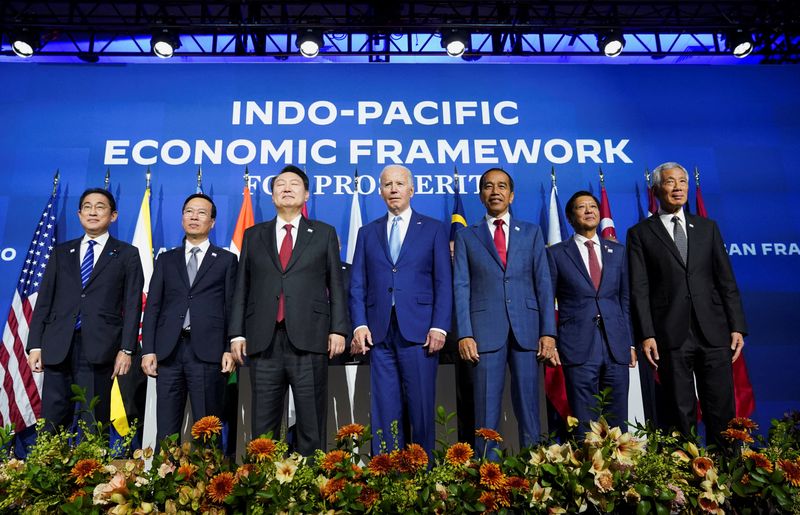By David Lawder
SAN FRANCISCO (Reuters) - The Biden administration has vowed to continue negotiating an ambitious Asia trade deal, but election-year pressures and resistance to tough commitments from some countries make a deal unlikely, trade experts and business groups say.
The Biden administration had emphasized finishing key chapters of its Indo-Pacific Economic Framework (IPEF) initiative trade "pillar" in time for this week's Asia-Pacific Economic Cooperation (APEC) meeting, aiming to offer the region an alternative to China's growing trade clout.
That effort failed after some countries, including Vietnam and Indonesia, declined to commit to strong labor and environmental standards with binding enforcement provisions.
The lack of trade outcomes overshadowed the Commerce Department's announcement that it had completed two more non-binding IPEF pillars on clean energy cooperation and anti-corruption measures.
Deputy U.S. Trade Representative Sarah Bianchi told Reuters that IPEF partners will "recalibrate" the trade talks in 2024.
But it gets harder from here, said Wendy Cutler, the former chief USTR negotiator on the Trans-Pacific Partnership trade deal with many of the same countries. TPP succumbed to 2016 election-year politics, leading to former President Donald Trump's U.S. withdrawal just after taking office in January 2017.
"My sense is that everyone's trying to put the best face on this, including our trading partners, but privately they're pretty discouraged," said Cutler, the Asia Society Policy Center head, who attended APEC events in San Francisco.
"They're left with no choice but to continue to work with us in 2024, but they recognize that the prospects for resolving these issues in an election year are slim to none," she added.
IPEF negotiators will face stronger demands for any agreement including enforceable labor provisions after Democratic Senator Sherrod Brown urged Biden to abandon the trade pillar rather than lower its standards.
POLITICAL LIMITATIONS
The Biden administration had hoped to avoid such political blowback by limiting the scope of the IPEF trade pillar, excluding any possibility of tariff cuts or market access improvements for Asian countries that could cost U.S. jobs.
But these limitations do not make it easier for countries to make difficult commitments, business groups say.
"The lack of ambition in the trade pillar sort of unites all stakeholders in skepticism," said Jake Colvin, president of the National Foreign Trade Council, a group representing major U.S. companies on trade issues.
Colvin said it will be a challenge for the Biden administration to satisfy labor and environmental groups with strong protections, while also offering more benefits for businesses and member countries, which want fewer barriers to trade in the region.
"Until they do that, the trade pillar will be a tough nut to crack."
DEADLINE PRESSURE
Trade deals, even limited ones, take a long time to negotiate. The Biden administration launched negotiations in September 2022, leaving an impossibly tight deadline ahead of the APEC summit, according to some trade experts.
"Their error was in trying to do an entire binding trade agreement in just over a year," said Lori Wallach, director of Rethink Trade, a pro-worker trade advocacy group.

In an ironic twist, the 12 member countries of the TPP successor trade deal, the Comprehensive and Progressive Agreement for Trans-Pacific Partnership (CPTPP) met during the APEC summit and affirmed their desire for more countries to join following Britain's accession.
Chinese President Xi Jinping said in prepared remarks to U.S. business executives that China was aligning itself with CPTPP standards to join that group and planned to "expand a globally-oriented network of high-standard free trade areas."